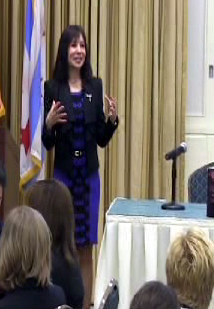 August 7th is Professional Speaking Day. Do you want to be a professional speaker?
I've been a professional speaker and executive speech coach for a long time. Aspiring speakers ask me all the time how they can become professional speakers. So in honor of Professional Speaking Day, here are some tips about the exciting, rewarding, and very challenging business of professional speaking.
August 7th is Professional Speaking Day. Do you want to be a professional speaker?
I've been a professional speaker and executive speech coach for a long time. Aspiring speakers ask me all the time how they can become professional speakers. So in honor of Professional Speaking Day, here are some tips about the exciting, rewarding, and very challenging business of professional speaking.
1. Professional speaking is a business. People fall in love with the glamor of being on stage before a live audience. But the truth is this. Delivering a one hour keynote or workshop is a fraction of the time that's required to make that speech happen. First and foremost, professional speakers are in the sales and marketing business. You're not a professional until someone pays you. Treat speaking as a business.
2. Professional speakers provide value. You must have a compelling story to tell or content that improves people's lives and careers. It takes time to research current trends and develop content that is relevant to your audience. Who is your market? Who will pay to hear you speak? What do they want and need to hear? What kind of return will they receive for their investment in you?
3. Professional speakers are experts. What is your expertise? Paid speakers have credentials and experience that give them credibility to speak on a selected topic.Unless you're a celebrity or reality star, you won't be hired unless you have a track record of success..That's why you don't see that many young people in the professional speaking business. A jack-of-all trades or someone who speaks on a wide array of topics will not be taken seriously.
4. Professional speakers are paid. Yes, we all do pro bono speeches for charity and for marketing to our target audience. But professionals earn their living from speaking and also maintain fee integrity. That means they have set fees for their services.
5. Professional speakers have multiple streams of income. In these challenging economic times, it's the rare speaker who earns 100% of his/her income from keynote speeches. Most professionals speakers have add-on services such as, workshops, facilitation, boot camps, consulting, coaching, off-site retreats, books and products.
6. Professional speakers are members of the National Speakers Association. I've been a member of NSA since 1991. Not all speakers are members, but if you're serious about the profession of speaking you need to get to a meeting. Join your local chapter. I'm a member of the New York chapter. NSA will change the way you think. Many speakers also belong to toastmasters. What's the difference? Toastmasters is for anyone who wants to improve their platform skills. NSA is for professional speakers who want to learn the business of speaking.
7. Professional speakers have a coach. Why? Because speakers continually need to raise the bar. Even the top speakers use a coach to fine tune their message and platform skills. If you're just starting out and can't afford a coach, find a mentor. Watch TED talks and youtube videos. Go to live events and conferences and take note of how the best speakers own the room.
 How did a college intern trump me in public speaking?
My marketing intern from Berkley College in New York City is from Korea and she is studying marketing as well as working on her English language skills. That was one of the reasons she was interested in interning with DiResta Communications. This semester Alaina is taking classes in marketing research and public speaking.
How did a college intern trump me in public speaking?
My marketing intern from Berkley College in New York City is from Korea and she is studying marketing as well as working on her English language skills. That was one of the reasons she was interested in interning with DiResta Communications. This semester Alaina is taking classes in marketing research and public speaking.
 August 7th is Professional Speaking Day. Do you want to be a professional speaker?
I've been a
August 7th is Professional Speaking Day. Do you want to be a professional speaker?
I've been a